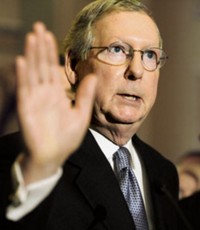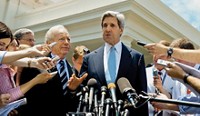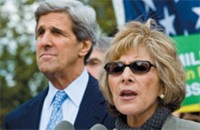Advertisement
Grab your lab coat. Let's get started
Welcome!
Welcome!
Create an account below to get 6 C&EN articles per month, receive newsletters and more - all free.
It seems this is your first time logging in online. Please enter the following information to continue.
As an ACS member you automatically get access to this site. All we need is few more details to create your reading experience.
Not you? Sign in with a different account.
Not you? Sign in with a different account.
ERROR 1
ERROR 1
ERROR 2
ERROR 2
ERROR 2
ERROR 2
ERROR 2
Password and Confirm password must match.
If you have an ACS member number, please enter it here so we can link this account to your membership. (optional)
ERROR 2
ACS values your privacy. By submitting your information, you are gaining access to C&EN and subscribing to our weekly newsletter. We use the information you provide to make your reading experience better, and we will never sell your data to third party members.
Environment
Corporate Leaders Urge Carbon Dioxide Cuts
Quick action on bill setting mandatory U.S. greenhouse gas reductions is goal
by Jeff Johnson
January 23, 2007
Leaders of 10 corporations and four environmental groups called on President George W. Bush and Congress to pass within one year national legislation requiring mandatory cuts in greenhouse gas emissions.
The program would be based on declining mandatory carbon dioxide emissions caps backed up by CO2 trading among emitters. The mandatory caps would kick in under a phased schedule beginning in five years with emissions to be 100–105% of today's level; in 10 years, the cap would drop to 90–100% of current emissions; and in 15 years, the cap would be 70–90% of current levels. Further out, the corporate and environmental CEOs urged Congress to pass legislation that would cut emissions to 60–80% of current levels by 2050.
The group, called the U.S. Climate Action Partnership, also wants legislation to include greater incentives to encourage development and deployment of technologies to limit or control CO2 emissions, such as energy-efficient technologies. But the partnership particularly focused on coal-fired power plants, which produce half the nation's electricity. It urged greater federal support and incentives for projects to capture CO2 and sequester it underground.
At a press conference on Jan. 22 announcing the agreement, partnership speakers said that the economy could survive the cuts and that their program would lead to opportunities for business. They expressed great support for a market approach through tradable allowances but noted that the caps may hit some sectors harder than others and that additional cost control options may be needed as the program is implemented.
The partnership's 10 corporations have a market capitalization of more than $750 billion and include Alcoa, BP America, Caterpillar, Duke Energy, DuPont, FPL Group, General Electric, Lehman Brothers, PG&E, and PNM Resources. The environmental groups are Environmental Defense, Natural Resources Defense Council, Pew Center on Global Climate Change, and World Resources Institute.
The proposal notes the importance of international programs to reduce global greenhouse gas emissions and urges the U.S. to become more active and to take leadership in international negotiations. It also warns that care must be taken to ensure that U.S. companies do not move production overseas to avoid emissions restrictions at home. On the other hand, it says U.S. action should not be contingent upon similar actions in other countries.
The plan was released the day before the President's State of the Union address, which is expected to have a large energy component. The President remains opposed to mandatory greenhouse gas emissions reduction, White House officials say.
Several members of the House and Senate who support climate-change efforts voiced strong support for the agreement. Sen. Barbara Boxer (D-Calif.), head of the Environment & Public Works Committee, called the announcement "one of few moments in history when all sides come together for the common good" and promised swift action in her committee. On the House side, Speaker Nancy Pelosi (D-Calif.) said that passing global warming is a top priority of the House and that she intends to move ahead with or without support from President Bush.
The CEOs declined to respond to repeated requests to assess different pieces of recently introduced legislation. "The agreement is a 'game changer,' " says Fred Krupp, president of Environmental Defense. "It is time for both parties to come together and pass legislation now."





Join the conversation
Contact the reporter
Submit a Letter to the Editor for publication
Engage with us on Twitter